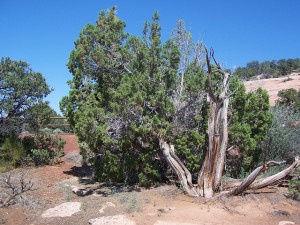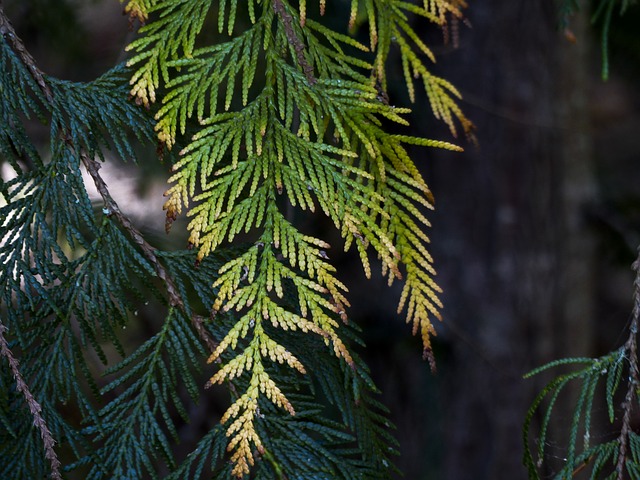by Amari Gold
Some years ago, while taking a class on entering the field of grace*, I was given an assignment to begin a dialogue with nature. There are a few books** written about the topic. One approach to learning how to hear nature’s voice is to open the heart, using it as an organ of perception. In my first attempts at it, I felt rather awkward and somewhat intimidated, wondering if this practice wasn’t better suited to those who are gifted with clairaudience. But after a short time, I began to perceive responses while greeting the trees and the rocks and the earth as I was walking through the forest.
On one of my favorite trails is a favorite tree of mine. It’s a cedar tree that has offered me gifts of its fragrant boughs from time to time. In recent years this particular tree hasn’t been looking too healthy to me. It seems to have grown spindly and barren, covered with moss. Realizing that I had not been paying much attention to it since its change in appearance, I stopped to greet it and to spend some time in communication with my old friend.
 It was hard to admit to the cedar tree that I felt as though it wasn’t well, perhaps it was dying, carrying the burden of pollution and imbalance upon our planet. My feelings of distress about this possibility had caused me to look away and not ask it for its gifts any longer. I could barely finish expressing my sentiment to the tree when I began to perceive a response.
It was hard to admit to the cedar tree that I felt as though it wasn’t well, perhaps it was dying, carrying the burden of pollution and imbalance upon our planet. My feelings of distress about this possibility had caused me to look away and not ask it for its gifts any longer. I could barely finish expressing my sentiment to the tree when I began to perceive a response.
The cedar tree communicated to me that it was indeed healthy and strong, and that it continued to serve vital functions within the forest and upon the earth. Any thoughts or perceptions that I might have otherwise are merely projections on my part. I replied that I was pleased to know that, and I thanked the tree for its message as I continued my walk pondering these new thoughts.
The following day I stopped to visit the cedar tree again and our conversation continued. What I heard from the tree brought a subtle peace and joy to my heart. It said, “There is a great deal of information in the world, a great deal of input and opinion about what is going on, what there is to do, and what needs to be done. If one really wishes to know what matters, there is no reason to pay attention to much other than oneself. All there is for each of us to do is to do what we can.”
 Ah. To do what we can do. These simple, elegant truths are among the greatest joys that I experience in nature. In this day and age it is sometimes difficult to recognize simplicity. Here in this simple statement I find great wisdom. While we strive to be our best selves, and to do our best work, and to find our mission in life, we can remember the advice of a cedar tree that tells us to simply do what we can in each moment. A kind thought or gesture, a silent prayer, a greeting to a tree, a piece of trash misplaced, a small donation to a good cause, a remembrance of the abundance of gifts that surround us in every moment, these are among the countless things that we can do.
Ah. To do what we can do. These simple, elegant truths are among the greatest joys that I experience in nature. In this day and age it is sometimes difficult to recognize simplicity. Here in this simple statement I find great wisdom. While we strive to be our best selves, and to do our best work, and to find our mission in life, we can remember the advice of a cedar tree that tells us to simply do what we can in each moment. A kind thought or gesture, a silent prayer, a greeting to a tree, a piece of trash misplaced, a small donation to a good cause, a remembrance of the abundance of gifts that surround us in every moment, these are among the countless things that we can do.
As we look upon the difficulties that we perceive as challenges to our world, remember to acknowledge the strength and dignity that remains present within each aspect and expression of nature, including ourselves.
*The Field: The Quest for the Secret Force of the Universe, by Lynne Mctaggart
**The Secret Teachings of Plants: The Intelligence of the Heart in the Direct Perception of Nature, by Stephen Harrod Buhner



